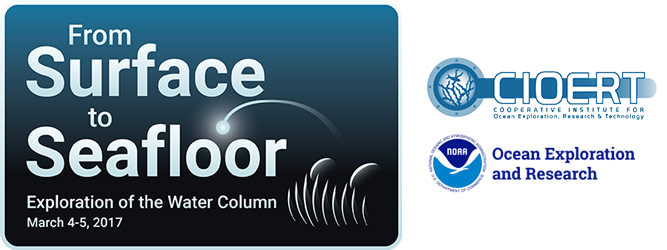Agenda
Dates: 4-5 March 2017
Location: Honolulu, HI
Venue: UH Manoa Campus Center , room 308
Facilitators: Amanda N. Netburn, Doug Harper
Prior to workshop
(2) Monday, February 27, 15:00- The R/V Okeanos Explorer will be conducting midwater ROV transects from ~500-2000 m off of American Samoa on February 27 (Read more about the full expedition). The event will be broadcast through telepresence, and interested scientists are invited to participate. For those who will be in town, please join me for this event at the Exploration Command Center at the University of Hawaii. There is also opportunity to participate from anywhere using your personal computer and phone line.
Day 1: March 4, 2017
Morning
Afternoon
Day 2: March 5, 2017
Morning
Afternoon
Breakout sessions (breakout session assignments):
Session I: What?
In the first breakout session, participants will outline exploration and research data requirements in the context of the water column. Groups will consider one of two exploration themes:
-
Baseline characterization (2 groups)
Primary:- What is a “baseline characterization” in the context of the water column?
- If you could only go to a spot in the ocean once, what is the most critical information that you would need to characterize the physics, chemistry, and biology of the water column there? Please do not consider the data collection platform or current technological limitations. Be specific, and create a prioritized list of data collection objectives.
- What geographical locations should be prioritized for future exploration of the water column? (i.e., areas where we lack robust data or have particularly interesting features to explore)
-
Research Needs (2 groups)
Primary:- What are the main scientific questions/gaps relating to the water column?
- What are the minimum data needs to address these questions? Please do not consider the data collection platform or current technological limitations. Be specific, and create a prioritized list of both the research questions and data needs.
- What are the current limitations to accessing or collecting those data? How could these be addressed?
- Cost Limitations – How can we come up with the most cost-effective approaches to collecting water column data?
- Technology limitations – How can existing technologies be used or improved upon to obtain the data we need? What new technologies should be developed?
Session II: How?
Opportunistic data collection – How can existing opportunities and assets be leveraged to provide the data needed to address the exploration and research priorities that were developed in breakout session I? (For example, on a seafloor ROV cruise, could a couple of hours be dedicated to water column transects at set depths/features to expand the geographic scope of midwater ROV operations and compare between sites?). Each group should outline specific protocols that could be used to leverage the opportunities they are assigned. More detailed guidance will be provided to each breakout group at the workshop.
- ROV (1 group)
- Geological and hydrographic cruises (1 group)
- Long-term observing networks (1 group)
- Innovative and autonomous systems (1 group)
Session III: When?
Participants are asked to design a dedicated water column exploration strategy, considering the priorities that were developed in Session I. The first two groups will design coordinated water column exploration programs that could be implemented in the next 1-5 years, utilizing currently available technologies. The second two groups should think well into the future and beyond current financial and technical limitations, incorporate “out-of-the-box” thinking, and be highly ambitious.
- Near-term (1-5 years, 2 groups)
- Long-term (10+ years, 2 groups)
Event Information
View hotel and travel information.
Participants
View a complete list of scientists participating in the workshop.
Background Materials
View relevant papers and other materials.
